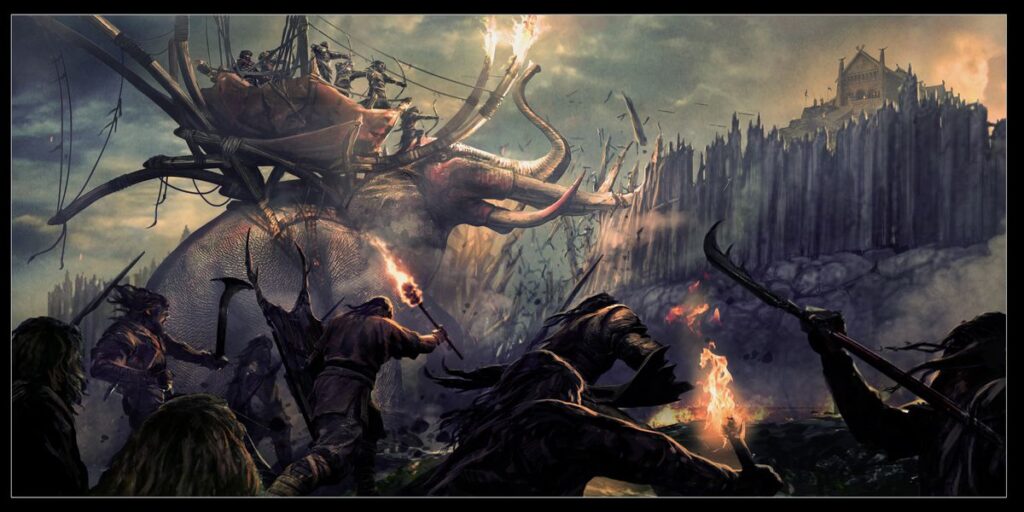Embracer Group, the ambitious, acquisition-hungry Swedish gaming conglomerate, has bought the rights to make films, games, merchandise, and theme parks based on J.R.R. Tolkien’s The Lord of the Rings and The Hobbit.
The deal comes as a surprise. Reporting on the sale of the rights by the Saul Zaentz Company earlier this year, Variety said the buyer was expected to be a Hollywood studio or tech giant. Amazon, which is about to debut its streaming series The Lord of the Rings: The Rings of Power, was a prime candidate. Variety also said the rights were expected to fetch at least $2 billion. Although the purchase price was undisclosed, it appears Embracer has acquired Middle-earth Enterprises, the Zaentz subsidiary that owns the rights, for significantly less than that.
Embracer announced the deal alongside five other, smaller acquisitions: Limited Run Games, the publisher of collectable physical editions of games; Tripwire Interactive, the developer and publisher of games like Killing Floor and Maneater; Singtrix, a company that creates vocal effects technology for karaoke and gaming; and Tuxedo Labs, developer of the destruction game Teardown. The sixth and final acquisition remains secret for now — but Embracer said it was the third or fourth largest of the deals, so it’s not major.
In a financial note, Embracer said the likely total cost of acquiring the six businesses, over a period of time, is expected to be 8.2 billion Swedish krona, which is around $788 million. Even if we assume the value of Middle-earth Enterprises to make up the vast majority of that sum, it’s still less than half what the prized Lord of the Rings rights were expected to fetch.
What happened? And how come Amazon or another major entertainment industry player wasn’t interested?
Middle-earth Enterprises — and now Embracer — owns the worldwide rights to make films, video games, board games, merchandise, theme parks, and stage productions relating to the Lord of the Rings trilogy and The Hobbit. But there are several caveats, exemptions, and questions marks over the extent of these rights.
The publishing rights to the books themselves aren’t included; they remain with the Tolkien estate and publisher HarperCollins. The licensing rights to Tolkien’s other Middle-earth works, The Silmarillion and The Unfinished Tales of Numenor and Middle-earth, are also still controlled by the Tolkien estate and HarperCollins, although Embracer says it now owns “matching rights” to these works — meaning it has the right to match any offer the owners may get from elsewhere.
TV rights are another major exclusion. Per Variety, the right to produce a TV series longer than eight episodes was carved out of the deal Tolkien’s estate made with Saul Zaentz back in the 1970s, meaning Amazon was able to deal with the estate directly when it bought those rights in 2017, cutting Middle-earth Enterprises out of the deal. Nevertheless, Embracer says Middle-earth Enterprises has a “financial interest” in The Rings of Power, as well as Warner Bros.’ upcoming animated film The War of the Rohirrim, and EA’s in-development mobile game Heroes of Middle-earth.
Finally, there’s a question mark over the extent of the film rights Embracer has just bought. Warner Bros., the studio behind Peter Jackson’s Lord of the Rings and Hobbit trilogies, has held the rights for years, but prior to the sale, the Saul Zaentz Co. was arguing that the rights reverted to it in 2021 because Warner Bros. had not been actively developing new film projects. According to Variety, Warner Bros. didn’t agree — and it’s entirely possible that The War of the Rohirrim was greenlit precisely so Warner Bros.’ lawyers could dispute this claim.
That’s a lot of asterisks. In particular, if there have been developments in the legal wrangle with Warner Bros. that make the film rights look even slightly less secure, that would have deterred many Hollywood buyers, and brought down the asking price for Middle-earth Enterprises.
Embracer may not be so concerned, though. It recently acquired tabletop gaming publisher Asmodee, which has been making Lord of the Rings licensed titles for decades, and it may well regard the video game rights as the jewel in the crown of this deal. Embracer has been on quite the acquisition spree over the last few years, and it recently snapped up both Dark Horse Comics and Square Enix’s Western gaming studios, including the rights to Tomb Raider.
At $300 million, that deal with Square Enix looked like a bargain, while for its part, Square Enix was said to be glad to be rid of its Western arm. It seems Embracer has once again swooped in on a desperate buyer, and bought the rights to a precious fantasy franchise — however disputed or limited — for a song.

